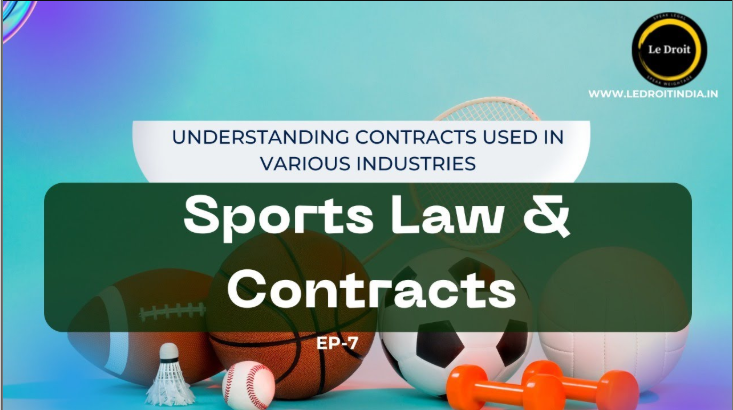
The world of sports is not just about athletic prowess; it’s a multi-billion dollar industry built on a complex web of contracts and regulations. From multi-million dollar player deals to massive broadcasting rights, every aspect of the sporting world is governed by a unique set of legal principles. This article explores the key contracts that form the backbone of the sports industry and the laws that govern them.
The Legal Playbook: Laws Governing Sports in India
Several key pieces of legislation in India provide the framework for sports-related activities:
- The Sports Broadcasting Signals (Mandatory Sharing with Prasar Bharati) Act, 2007: This act ensures that sporting events of national importance are accessible to the public by mandating the sharing of broadcasting signals with Prasar Bharati.
- The National Anti-Doping Act, 2022: This act establishes the National Anti-Doping Agency (NADA) as the regulatory body for anti-doping measures in India, ensuring fairness and integrity in sports. (Note: A direct link for the 2022 Act is not available on Indian Kanoon, which typically hosts acts after they are fully integrated into the legal database).
- The Public Gambling Act, 1867: This act governs gambling and betting in India, with sports betting being largely illegal, except in a few states like Sikkim and Goa.
- Labour and Employment Laws: Players, coaches, and support staff are protected under these laws, which cover contracts, wages, and working conditions.
- The Indian Contract Act, 1872: This is the foundational law for almost all sports-related agreements, including sponsorships, endorsements, and broadcasting deals.
- Copyright Act, 1957 & Trade Marks Act, 1999: These laws protect the commercial and branding aspects of sports, such as broadcasting rights and team logos.
Key Contracts in the Sports Industry
The sports world relies on a variety of specialized contracts to function. Here are some of the most important ones:
- Player Contracts/Employment Contracts: These are formal agreements between an athlete and a team, outlining salary, bonuses, injury clauses, and termination conditions.
- Sponsorship & Endorsement Contracts: Brands leverage the fame of athletes to promote their products through these agreements, which include clauses on exclusivity and image rights.
- Broadcasting & Media Rights Contracts: These are the biggest revenue source in sports, where leagues sell the rights to telecast matches across different territories and platforms.
- Coaching & Support Staff Contracts: These agreements cover the terms of employment for coaches, physiotherapists, and other essential support staff. Clauses often include salary, tenure, and confidentiality terms.
- Collective Bargaining Agreements (CBAs): Negotiated between leagues and players’ unions, CBAs set overall employment terms like minimum salaries and revenue sharing.
- Sports Agency & Representation Contracts: Athletes hire agents to secure contracts and endorsements, with these agreements detailing the agent’s commission and responsibilities.
- Collective Image Rights Agreements: These contracts allow for the collective use of a team’s image and likeness for promotional purposes, ensuring even lesser-known players can benefit financially.
- Sports Data & Analytics Agreements: These agreements govern the collection, ownership, and use of player and match data for various purposes, including betting and fantasy sports.
- Anti-Doping & Medical Agreements: These contracts ensure compliance with anti-doping regulations and outline procedures for mandatory drug testing and medical consent.
- Stadium Naming & Sponsorship Rights Agreements: These agreements involve the corporate branding of stadiums in exchange for sponsorship fees, covering the duration and visibility obligations.
- Anti-Corruption & Integrity Agreements: These contracts bind athletes and officials to maintain honesty and fair play, preventing practices like match-fixing.
- Investment & Business Partnership Agreements: These contracts govern financial investments and partnerships in sports ventures, such as the ownership of IPL franchises, defining profit-sharing and governance.
Frequently Asked Questions (FAQs)
Q1: What is the difference between a sports contract and a general contract?
While both are governed by the Indian Contract Act, sports contracts are highly specialized. They are tailored to the unique needs of the sports industry and are influenced by specific laws related to broadcasting, anti-doping, and intellectual property.
Q2: Can an agreement written on a napkin be legally valid?
Yes, as long as it fulfills all the essential elements of a contract, even an agreement written on a napkin can be considered valid. The famous first agreement between Lionel Messi and FC Barcelona was reportedly made on a napkin.
Q3: What is the role of a non-disclosure agreement (NDA) in sports?
NDAs are crucial in sports to protect confidential information. For instance, coaches and support staff sign NDAs to prevent the leaking of team strategies or player health information.
Q4: How is sports data used and regulated?
Sports data, including player statistics and health records, is a valuable commodity. It’s often purchased by betting companies and fantasy sports platforms. Agreements are put in place to govern the collection, use, and protection of this data to prevent misuse.
